- All 330 |
- Page 1/22
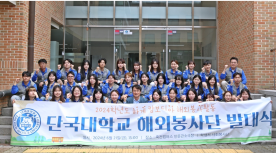
2024.07.19
874
![]()
Dankook University’s student volunteer corps, part of the Office of Student Affairs area, are traveling to Mongolia and Cambodia over the summer break to exemplify Dankook’s guiding principles of truth and service. Thirty-five members from the Jukjeon campus overseas volunteer corps (32 students, 3 faculty) will visit Puok Elementary School in Siem Reap, Cambodia from June 24 to July 4. On June 21, the volunteers held a kick-off ceremony at the small auditorium in the Jukjeon campus’ Humanities Hall in hopes of a successful trip. The volunteer corps will start by serving meals through the Dail Community’s Babfor Services. They will teach math, science, art, physical education, and Korean language and culture, draw murals, repair school facilities, and conduct musical and cultural performances. Meanwhile, 24 members of the Cheonan campus overseas volunteer corps (lead by Professor Il Suk Lee) will embark on a volunteer trip to Ulaanbaatar, Mongolia from June 29 to July 8. The delegation will visit School #9 to volunteer. They will teach Korean language, science, art, physical education, carbon neutrality, and environmental education. Additionally, they will create wall murals, carry out maintenance work around the school, install recreational facilities, offer health education, and deliver a special performance and village festival for the local community. “[I] see our students’ efforts of practicing and preparing for the volunteer trip will help them flourish at the volunteer sites,” said professor Sung-soon Park, head of the volunteer corps, who added, “I hope everyone will be able to share our values of truth and service and return home safely.” Since the volunteer corps was inaugurated in 2007, Dankook University has been actively carrying out volunteer work at home and abroad. Over 2,500 students and faculty members have provided services in different countries, including Mongolia, Cambodia, Vietnam, Nepal, Uzbekistan, Indonesia, and Laos to practice the university’s educational direction of truth and service.
최지영
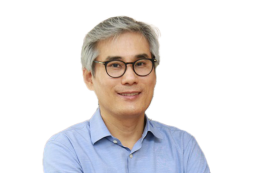
2024.07.19
480
![]()
Professor In Ho Kim of the School of Life Resources was invited to the Haiyou Talent Festival in Jinan, China on June 12 to be honored as an academician, the highest title given to scholars in China, and was registered on the talent list of Jinan. Professor Kim is currently conducting research with Shandong Jinzhuji Pharmaceuticals on pet feed and snacks and active probiotics for pigs. He also submitted new projects for the Chinese government with the company. “It is a great pleasure to be partnering in China on deep-dive studies and I hope to contribute to the promotion of further exchanges between our two countries in science and technology to create innovative research accomplishments,” said Professor Kim. Professor In Ho Kim graduated from Dankook University’s Department of Animal Resources Science and obtained his Ph.D. from Kansas State University before being appointed to Dankook University in 2000. He is a member of the Korean Academy of Science and Technology and currently heads the Smart Animal Bio Research Institute, one of the core research institutes of DKU, carrying out education and research on low-carbon, environment-friendly swine systems, animal feed, and animal nutrition.
최지영
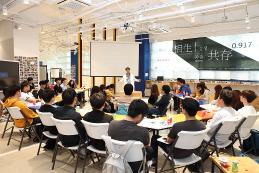
2024.06.24
561
Sponsored with KRW 8.6 billion over 3 years to nurture community innovators tackling social conflict Selected for the most innovation and convergent talent cultivation programs (cutting-edge industries, humanities and social sciences) along with Seoul National University Dankook University was chosen as a participating university in the social structure division of the Humanities Utmost Sharing System (HUSS) program hosted by the Ministry of Education and the National Research Foundation of Korea. Dankook is taking the lead in convergence education in the humanities, being selected for the second time for HUSS after being named a lead university for the HUSS program in globalization and culture last year. This year, DKU stepped up its efforts to foster future industries and convergent talent after also being chosen as a lead university in the next-generation display division of the Convergence and Open Sharing System (COSS) program after participating in the National Center of Excellence in Software program. In fact, DKU was selected for five government programs related to talent cultivation. Three were in biomedicals, next-generation displays, and semiconductor components as part of the COSS program and two were in globalization & culture and social structures as part of the HUSS program. This is the most among Korean universities, tied with Seoul National University. DKU also ranked first, along with Kookmin University, as a lead university on the most projects, leading in biomedicals, next-generation displays, and globalization & culture. Dankook is participating in the ‘HUSS Consortium for Building a Community for Mutual Growth’ together with Sogang University (lead university), Sangmyung University, Daejeon University, and Wonkwang University. Grants worth KRW 8.6 billion over the course of three years will be provided to DKU to focus on the key initiative of ‘change in social structures as a response to building a healthy community ecosystem’ and to develop a convergence curriculum focused on the humanities and social sciences, to improve educational foundations, and to renew relevant academic systems. One hundred and seventeen faculty members representing thirty-two departments from the five universities will work together to nurture 5,000 ‘community innovators’ armed with humanities insight, social analytics, cultural content production capabilities, and technological knowhow in using artificial intelligence and big data. The consortium is broken down into ‘family and education,’ ‘urban and rural regions,’ ‘organizations and industries,’ and ‘culture and generations’ majors and will develop over 60 professional courses. Each major consists of four career tracks – Creator, Strategist, Practitioner, and Analyst – to cultivate AI convergent talent that can contribute to social integration and building communities for mutual growth. Moreover, innovative education models, including modular curricula, short-form & microlearning, telepresence lectures, living labs, and cohort learning, will be adopted and shared across universities in the consortium through the Echo Integrated Platform. Seven departments from Dankook, namely political science and international relations, counseling, public administration, urban and regional planning, history, philosophy, and statistics and data science, are participating in HUSS. Experts in these areas will be involved in developing and delivering courses and a specialized curriculum for those majoring in urban and rural regions and family and education. Through the living lab, we will carry out project-based learning programs to address local issues where Dankook is located, such as in the Seoul metropolitan area and Choongcheong provinces, partnering with local communities to seek solutions for real-world challenges they face. Furthermore, the university will strengthen areas of the liberal arts needed in modern society, such as everyday philosophy content based on our research capabilities in contemporary studies of the humanities, while strengthening AI and software education by offering software and introductory AI courses as part of the core curriculum for students studying the humanities or social sciences.
최지영
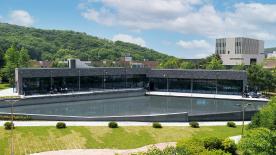
2024.06.24
98
An open library and café covering over 540 square meters To serve as a natural wellness spot and community hub Dankook University has opened Beartopia on the Jukjeon campus, an open library with nature as its backdrop. The new nature-friendly library is located at the campus’ waterfall park which has become a popular community destination for those seeking some rest and tranquility. The library, which covers over 540㎡, gets its name from ‘Bear,’ which is Dankook’s mascot, and the Greek term ‘topia,’ which refers to land, field, and location. Its goal is become a venue for visitors to rest or study as well as to foster creative ideas in preparation for the future. Beartopia consists of an open library, university merchandise display, coffee shop, and outdoor rest area. Equipped with more than 2,000 books, it functions as an open library where students and citizens alike can come and go freely with a good book. The outdoor area has been sculpted into an enchanting venue that showcases an artificial waterfall and allows visitors to pause and recover from their busy lives. “Dankook University is taking the lead in providing venues for healthy lifestyles and quality education to members of the university and local community to achieve our sustainable development goals (SDGs),” explained DKU President Soon-Cheol An, who added that “[we] will offer programs to encourage people to read and experience the joy of reading while embracing nature, and also strive to promote various creative arts events.”
최지영
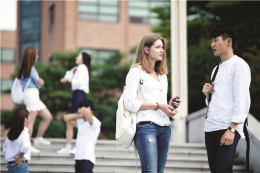
2024.05.17
246
![]()
Dankook University has been named as one of the new testing locations for the Test of Proficiency in Korean (TOPIK), administered by the National Institute for International Education (NIIED). The TOPIK will be offered at DKU six times per year over the course of two years (total of 12 times), starting from July of this year until June 2026. The test will be available to approximately 500 candidates for each sitting. TOPIK is an exam taken by foreigners or ethnic Koreans, whose native language is not Korean, to measure their Korean language proficiency. The scores are widely used by candidates to study at or graduate from Korean universities and graduate schools, qualify for scholarships, and apply for job opportunities. Dankook was selected as a testing location based on excellence in 11 categories, including ease of access, top-notch facilities, stable testing performance, and capacity of test supervisors. “Despite growing demand for TOPIK, the lack of testing locations in the area have made it inconvenient for the many foreign students and office workers living in Yongin City,” explained Professor HanSeung Cho who is the Associate Vice President for International Affairs at DKU. He went on to add that he “[expects] Dankook to contribute to improving access for candidates with DKU named as a new TOPIK testing location.” Dankook has also established the PRIMUS International College to strengthen our competitiveness in providing international education. For students taking Korean-track programs, a School of Global Core Education has been set up to open in the 2025 Spring Semester, which will deliver an intensive Korean language curriculum during students’ first year to strengthen their learning abilities. With the increased convenience of the new TOPIK testing location on campus, we look forward to more foreign students taking the TOPIK exam and making improvements in their academic achievements.
최지영
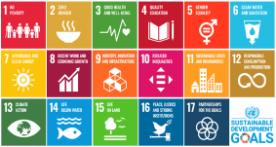
2024.05.07
230
![]()
Leveraging SDGs keywords to boost promotion of research findings A new website showcases Dankook University’s efforts to achieve the UN’s Sustainable Development Goals (SDGs). On April 8, the Dankook SDGs Committee (chaired by Jaeil Kim, DKU Executive Vice President for External Affairs) launched the website to raise awareness of building a sustainable society and to promote and monitor the university’s SDGs activities. Users can navigate through the website menu, which consists of the Dankook SDGs Action Declaration, information on what the SDGs are, activities at DKU, and notices. It introduces the 17 SDGs that humanity should aim to achieve and to practice the concept of sustainable development. It also shows DKU’s achievements made since 2020 in relation to each of the 17 goals. In addition, Dankookites can download a list of keywords for each of the 17 SDGs. DKU has a subscription to SciVal, a research performance assessment solution offered by global academic publishing company Elsevier. If a researcher’s paper includes an SDGs keyword in its title, abstract, or keywords, it is categorized as an SDG-related study and becomes available to QS (Quacquarelli Symonds), a higher education analysis and services provider, or THE (Times Higher Education). “We look forward to the website serving as a window to highlight various SDGs activities, broaden our horizons, and boost participation of Dankookites in this area,” said chairman Kim who went on to add his hopes for the website are “to lay the foundation for the SDG-related research of Dankook professors to be shared broadly by taking advantage of these keywords.” The website can be reached by clicking the ‘Dankook SDGs banner’ at the bottom of the Dankook University website (or at https://cms.dankook.ac.kr/web/sdgs). If you would like to share activities related to the SDGs, you can download, fill out, and submit an Action Form, found under the Notice menu. The Dankook SDGs Committee was set up last December to drive university efforts to achieve the SDGs. A declaration ceremony was held in February to strengthen our commitment and determination to practice values critical for the next generation through environmental conservation and social responsibility, both on and off campus.
최지영
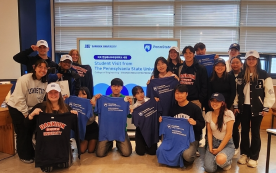
2024.04.08
505
![]()
On March 8, a student delegation from Penn State University in the U.S. visited Dankook’s Jukjeon campus to explore the DKU start-up program. Twelve undergraduate students, including Charlotte Patterson from Penn State University’s College of Engineering, kicked off their stay by observing professor Hyojung Koo’s (Department of International Business Administration) ‘IT and Business Administration’ class in the morning. Following that, students attended a special lecture presented by Sangho Lee who founded Mand.ro, a prosthetic solutions company, with assistance from DKU’s Startup Support Foundation. After listening to Lee’s story behind establishing the company and learning about its product development process, students tested Mand.ro’s robotic finger prosthesis which recently won the Best Innovation Award at CES 2024. The delegation also stopped by the Seok Juseon Memorial Museum to enjoy the extraordinary aspects of Korean culture through folk costumes and artifacts. They were greeted by five student ambassadors who volunteered as ‘buddies’ to introduce the visiting students to Korean campus life, not to mention the tasty Korean-style braised chicken called jjimdak. “It was a memorable time, talking with fellow students who share similar interests in studies, hobbies, and college life while also learning about each other’s cultures,” said Daekeon Yoo (Senior, School of Communications), President of DKU’s Global Ambassadors. Meanwhile, DKU President SoonCheol An met with professors Ted Graef and Brad Groznik of Penn State’s College of Engineering to discuss how students from Penn State can participate in Dankook’s International Summer School program while also exploring an agreement between the two universities for international exchanges. The discussions were also joined by Assistant Vice President Jisuk Chang of DKU’s Office of International Affairs and professors David Kelleher and Hyojung Koo.
최지영
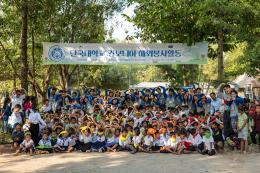
2024.02.19
2,252
![]()
Taking advantage of the winter break, the volunteer corps from Dankook University’s two campuses traveled overseas to volunteer in Cambodia and Vietnam. On January 6th, thirty-one members of the Jukjeon campus Overseas Volunteer Corps, led by Professor Sung-soon Park, departed for a 12-day trip to visit and volunteer at the Tatok School in Siem Reap, Cambodia. After serving meals through Dail Community’s Babfor Services, volunteers taught students math, science, Korean culture, and art, and painted a mural at the school. They also made a donation to fund a parking area where students could store their bicycles, which will create a better learning environment. On the same day, thirty members from the Cheonan campus Overseas Volunteer Corps, led by Professor Byeong-gu Song, also embarked on a ten-day journey to volunteer at the Trương Văn Hai Primary School in Ho Chi Minh City, Vietnam. Volunteers taught children Korean language, science, art, and physical education, helped paint school facilities in addition to a mural. It was even more meaningful with students majoring in Korean language and culture at nearby Van Lang University joining the group to extend a helping hand as interpreters. After volunteering at the primary school, the DKU delegation visited Van Lang University where they had the opportunity to engage in further cultural exchanges. “I went [on this trip] to give, but I received so much love in return from the children there,” said Heeju Yun, a senior majoring in communications who was in charge of the art class in Cambodia. She added that “[I] would like to continue taking part in sharing with others through volunteering and making donations, even after graduating.” Hyowon Kim, a senior majoring in English who volunteered in Vietnam commented, “we stayed up all night getting the programming ready, but it was worthwhile seeing how the children enjoyed what we had prepared,” and went on to say, “volunteering in Vietnam was a priceless experience that made me realize the power of education and the importance of communication between different cultures.” The Dankook University volunteer corps were founded in 2007 and have been actively conducting volunteer work both at home and abroad ever since. Over the years, more than 2,500 students and faculty members have traveled overseas to practice Dankook’s guiding principles of ‘truth and service’ in other countries, including Mongolia, Cambodia, Vietnam, Nepal, Uzbekistan, Indonesia, and Laos.
최지영
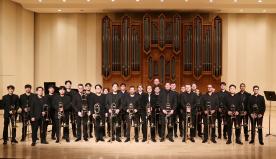
2024.02.01
4,570
![]()
On January 8, the Korean Trombone Symposium 2024 ended after a six-day journey at DKU’s School of Music where people from different cultures, who speak different languages, were brought together through the language of music. Dankook University’s professor Gunyong Lee (School of Music, Instrumental Music Major) planned the symposium and invited world-famous trombonists to create a venue for young performers to learn and interact with fellow artists. With the age and nationalities of participating students varying widely, more than 100 students, including 20 from Columbus State University in the U.S., and universities in Canada, Singapore, Taiwan, and China, took part in the event. Globally distinguished trombonists also joined from around the world, including Colin Williams, Bradley Palmer, Jose Milton Vieira, Brian Hecht, Zachary Bond, Jongse Park, and Gunyong Lee. “Practicing hard together for six days, I became close with my Korean friends. It has been musically inspiring for all of us,” said Christopher Bassett, a bass trombonist from Columbus State University who took part in the symposium. Meanwhile, Minchang Cheong from Dankook’s School of Music commented that “it was an honor to meet world-famous trombonists that I had only seen on YouTube. The symposium definitely helped me grow by performing and playing with others.” Based on the new friendships formed, the symposium provided a stage for students to then perform together in the 2024 Trombone Contest, the Columbus State University Concert, Concerto Night from the Korean Trombone Choir, a musical ensemble, and a New Year’s concert.
최지영
![[2024 New Year’s Message] Advancing towards Dankook’s future with a ‘Mago Soyang (麻姑搔痒)’ mindset](/html_portlet_repositories/thumbnail.135467.png)
2024.01.31
1,632
![]()
As we usher in the year of the dragon, we wish everyone in the Dankook family health and happiness in 2024. With this year being the ‘year of the blue dragon,’ which represents abundance and prosperity, we share with you these new year’s messages from Chairman Hosung Chang of the DKU Foundation, DKU President SoonCheol An, and President Sang-bae Lee of the Dankook Alumni Association Mago Soyang (麻姑搔痒), opening the road to innovation and unity Chairman Hosung Chang of the Dankook Foundation chose Mago Soyang (麻姑搔痒) as the phrase to embody hopes for the new year. The literal translation of Mago Soyang is that an angel with long nails comes and scratches where it itches, implying that you will be able to satisfy your needs and things will turn out as desired. Chairman Chang encouraged Dankookites to support each other, extend a helping hand amid difficulties faced in higher education such as the shrinking school-age population and a freeze on tuition. He shared his hopes to make this the year for building a top-notch education and research system based on the Dankook spirit of challenge and creation. Breakout year for innovation and challenge, marching toward Dankook’s centennial Dankook University President SoonCheol An announced the ‘Vision for Dankook Innovation 5.0,’ which aims to drive leading innovation in educational research, establish DKU’s position as a global university, pursue sustainable development for the university, and strengthen our financial base. He shared that innovation is inevitable and no longer a matter of choice to realize the goal of ‘Proud Dankook, Strong Dankook.’ President An said this year, which commemorates the university’s 77th anniversary, shall be the year we embark on the grand journey of innovation and facing any challenges as we march toward 100 years of Dankook. Along with 240 thousand Dankook alumni, he shared hopes for DKU to advance as a prestigious global university in 2024. May Dankookites soar higher and reach farther, like the blue dragon President Sang-bae Lee of the Dankook Alumni Association relayed his wishes for all members of the Dankook community to soar higher like the blue dragon and reach farther toward their aspirations. He also shared his commitment to do his utmost to provide support in various areas for the 240 thousand DKU alumni to take pride in being a part of the Dankook family.
최지영
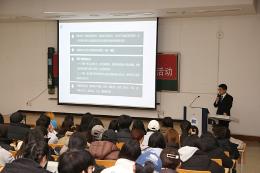
2023.12.28
593
On November 29, Dr. HanSeung Cho, Associate Vice President for International Affairs, and the Office of International Affairs invited Mr. Zhong Hong-nuo, the Chinese Consul General of China to Korea, to give a special lecture on ‘voice phishing scam prevention’ for Chinese students at DKU. Over 250 Chinese students studying at Dankook attended the special lecture that covered topics such as the various types of voice phishing scams recently targeting Chinese students in Korea, examples of voice phishing claiming to be the Chinese Embassy in Korea, and prevention against drug-related crimes. Consul Zhong also introduced useful information for students such as the Consulate-General’s help center and details on possible job opportunities. “This lecture was prepared in hopes that the Chinese students in Korea complete their studies successfully. I sincerely look forward to you enjoying your time at Dankook University,” said Consul Zhong. Currently, there are a total 1,145 Chinese students enrolled at Dankook with 619 in undergraduate programs and 526 studying at our Graduate School. The Office of International Affairs offers international students various programs including an early adaptation program in partnership with the Ministry of Justice’s Migration Research and Training Center, foreign language (English, Chinese) support at the Dankook Counseling and Mediation Center, Crime Prevention Training in cooperation with the Gyeonggi Seobu Provincial Police, and special lectures on employment opportunities tailored to foreign students in Korea. International students with outstanding Korean proficiency are also awarded various scholarships. In addition, the office helps them adjust to studying in Korea by assigning global PD professors and mentors to international students to support them and provide tutoring in each of their majors.
최지영
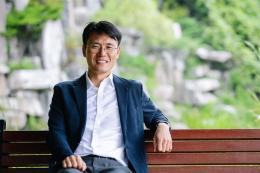
2023.12.28
548
A 5G telecommunications technology patent developed by Professor Suhan Choi (Department of Mobile Systems Engineering) has joined the 5G standard essential patent (SEP) pool of Avanci, a global company that manages SEPs in the area of information and telecommunications. SEPs are patents that must be used when manufacturing products in line with 3GPP (The 3rd Generation Partnership Project), an international telecommunications standard development organization. This is the first time any Korean university has listed a telecommunications SEP in a certified patent pool. Dr. Choi’s SEP is a data repeat transmission technology for 5G Ultra-Reliable and Low Latency Communications (URLLC). Repeatedly transmitting critical data that must be delivered rapidly, it is a core technology in realizing 1ms ultra-low latency in wireless communications which is required for 5G. The 5G networks where Dr. Choi’s technology is applied can shorten delays in data transmission to one tenth the level of LTE. Supporting stable data transmission and reception allows it to be used in a wide range of industries, including autonomous driving vehicles, remote surgeries, remote control, unmanned aerial vehicles, smartphones, medical devices, IT·electronic devices, robots, and smart factories. The technology was recognized in the global market by being included in the Avanci 5G pool through UUCOM, a company that specializes in business development for patents. Avanci’s 5G pool includes participation from licensors such as Samsung Electronics, Qualcomm, Sony, Nokia, and Huawei and licensees such as BMW, Mercedes-Benz, and Hyundai Motor Group. “As the scope of 5G high-speed telecommunication network applications is spreading globally to various industries, this change will offer Korea the opportunity to strengthen our telecommunications technology and sharpen the competitiveness of our intellectual property in the global market,” explained Dr. Choi. He went on to say that “the Industry-University Cooperation Foundation identifies prospective technologies for securing SEPs to increase the share of patent applications overseas. It works with the Korean Intellectual Property Office’s Standard Essential Patent Generation Support Project carried out by KISTA (the Korea Intellectual property Strategy Agency) to support analysis of trends in technology standards and build profit generation models with the help of patent specialists and patent lawyers.” “Avanci has many telecommunications technology patents that are essential in future automotives, requiring OEMs to pay royalty fees for the SEPs that go into producing a connected car,” explained Professor Wan-je Cho, head of the Industry-University Cooperation Foundation, who added that “when connected cars become more widespread, Professor Choi’s patents are projected to bring significant returns to DKU.”
최지영
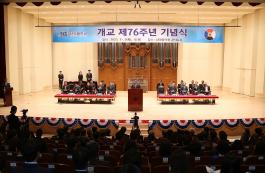
2023.11.27
587
On November 2nd, a ceremony was held on Dankook University’s Jukjeon campus to mark the university’s 76th anniversary. The ceremony aligned with the 59th memorial of DKU founder Beomjeong Chang Hyong and the 76th memorial of founder Hyedang Cho Huijae. Joint Memorial Service for the 59th anniversary of Beomjeong Chang Hyong’s passing and the 76th anniversary of Hyedang Cho Huijae’s passing A joint memorial service for DKU’s founders was held at the Dankook University History Museum’s convention center. Dankook Foundation Chairman Hosung Chang and Honorary Chairman Choongsik Chang were among the attendees along with DKU President Soon-cheol An, faculty members, family members of the founders, and student representatives who all gathered to pay tribute and reflect on the noble cause for which the university was established. As part of the ceremony, participants placed flowers in front of Chang Hyong’s portrait while listening to a recording of his voice from when he was alive. DKU 76th Anniversary Ceremony held to “look back on the university’s proud history…and strengthen commitment toward realizing 100 years of Dankook” Following the memorial service, the university’s 76th anniversary ceremony was held at the Nanpa Concert Hall with more than 600 participants attending, including members from the Dankook Foundation, school officials, and recipients of a special award given in celebration of the university’s anniversary. Attendees looked back on the university’s proud history of 76 years and renewed their commitment to leap forward toward ‘100 years of Dankook.’ “Seeking truth and honing wisdom to establish a foundation for restoring true talent to contribute to this world” [Dankook University Mission Statement] “As we proudly celebrate Dankook’s 76th anniversary, I extend my heartfelt appreciation to all members of the Dankook family, including our faculty, staff, alumni, and sponsors who have helped the university overcome many obstacles -big and small- throughout the years and nurture exceptional talent,” said DKU Foundation Chairman Hosung Chang in his commemoration remarks. He went on to say, “I applaud everyone for your hard work that, despite difficult conditions, has allowed us to continuously attain major government-funded projects such as the Campus Innovation Park and Convergence and Open Sharing System (COSS). Your efforts have helped us sharpen our research capabilities and promote industry-academia partnerships to create the best learning environment for our students.” Meanwhile, DKU President Soon-cheol An said, “based on remarkable accomplishments in industry-academia partnerships in next-generation industries such as semiconductors, future automotive, biomedicals, and hydrogen energy, Dankook University attracted a total KRW 100 billion in external research grants as of the end of October,” and went on to ask “all members of the university and the 230,000 Dankook alumni to come together as we march toward Dankook’s centennial.” DKU Alumni Association President Sang-bae Lee also shared his hopes saying, “it is an honor to have graduated from this prestigious private university that contributes to the nation and its people by cultivating outstanding talent. Witnessing my alma mater start a new chapter in its history, I will also do my utmost along with our alumni association to realize the university’s vision of becoming a first-class university.” To celebrate the university’s 76th anniversary, the Dankook University History Museum (Director Jong Su Lee) published The Iron Birch’s Dream. The e-book depicts the life of DKU founder Beomjeong Chang Hyong as an independence activist and covers the history of our university, which is the only private college that was founded with domestic capital during Korea’s colonial period. The book touches on Chang Hyong’s inspiring spirit of ‘suppressing the strong and helping the weak (抑强扶弱)’ which deeply resonates with all Dankookites. The e-book, which can be found on the Dankook University History Museum’s website, is an easy and informative read for all audiences from middle and high school students to adults who wish to learn about Dankook’s history. In addition, faculty and staff members who have continuously served the university were awarded with recognition during the ceremony.
최지영
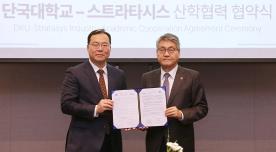
2023.11.27
582
![]()
“To grow as an innovative R&D hub in 3D printing, connecting Korea to global markets” Stratasys to inject KRW 5.125 billion into the Jukjeon campus to open the DKU-SSYS Cutting-Edge Manufacturing Convergence Research Center in December Dankook University is embarking on a project to establish Asia’s first 3D printing R&D Center together with the global leader in the field, Stratasys. On October 11th, a signing ceremony was held in Pangyo where the two organizations signed an MOU to foster cutting-edge manufacturing talent and to work together to nurture 3D printing engineers who will take the lead in the fourth industrial revolution. Dankook University President Soon-cheol An, Stratasys Vice President Yann Rageul, Stratasys Korea GM Brian Moon, DKU Vice President for Industry-academia Cooperation Joa-sub Oh, and representatives from the two parties took part in the ceremony. From the MOU, the two organizations will establish Asia’s first ‘Cutting-edge Manufacturing Innovation Convergence R&D Center’ for 3D printing at the Jukjeon campus in December. Stratasys will extend a total of KRW 5.125 billion in cutting-edge 3D printing equipment and provide remodeling and training programs. The new R&D center will be housed in the Main Laboratory Building and cover a 264㎡ area, equipped with the latest SLA, SAF, and FDM 3D printers. A 50㎡ space for corporate collaboration is also planned to be set up to support manufacturers. With a vision to advance the research center as an innovation hub in 3D printing and serve as a bridge between Korea and the global market, the two organizations will boost research for next-generation high precision 3D printers by operating joint R&D equipment, conducting co-studies on 3D printing material and devices, and delivering various training and research programs to cultivate necessary talent for the field. “We look forward to this partnership serving as a stepping stone for DKU, which is at the forefront of fostering professional talent and conducting research in cutting-edge fields, such as future automotives, robotics, semiconductors, and digital healthcare, and to grow as an R&D hub for high-tech manufacturing industries in Korea,” said DKU President Soon-cheol An. Stratasys was founded in 1989 and is the global leader in 3D printing, offering 3D printing technologies and solutions across all industries, including aerospace, automotive, industrial machinery, and medicine.
최지영
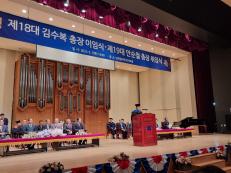
2023.10.05
712
![]()
Dankook’s 18th University President, Soobok Kim, expressed “gratitude to the Dankook family,” while the incoming 19th President, Soon-Cheol An, shared his “commitment to increasing university finances and improving the university’s reputation […] and [asked the community] to join in writing Dankook’s history of innovation.” On September 7th, a special ceremony was held at the Dankook University’s Nanpa Concert Hall on the Jukjeon campus to bid farewell to Dankook’s 18th University President, Soobok Kim, and to welcome the University’s 19th President, Soon-Cheol An. Many guests attended the ceremony, including the Dankook Foundation’s Honorary Chairman Choong-sik Chang, incumbent Chairman Hosung Chang, DKU Alumni Association President Sang-bae Lee, Saeeden Presbyterian Church’s Senior Pastor Kang-suk So, Pai Chai University President Wook Kim, parliamentarian Choun-sook Jung (Democratic Party of Korea), and university officials. The guests applauded the new president’s blueprint for the university while paying respect to his predecessor for his hardworking efforts. Former DKU President, Soobok Kim looks forward to “the new president being at the center of leadership for the university’s future” Stepping down from the university president position, former DKU President Soobok Kim said in his departure speech that “it has been an honor to be the first Dankook alumnus to serve as university president throughout the 72-year history of Dankook. I will always be proud and grateful for being a part of Dankook’s history.” Kim, who was known for placing importance on communication, also looked back on his 4-year term and commented that “despite hardships, such as COVID-19 and the grim reality of declining school-age population faced by higher education, we were able to overcome many impediments thanks to the passion all Dankookites demonstrated toward the university.” During his term, President Soobok Kim rapidly responded to the global pandemic by setting up an emergency committee, acting as a strong backdrop for the university, and making it possible to maintain steady university operations and a stable research foundation. He also contributed to boosting industry-academia partnerships and strengthening the university’s research capabilities by continuously winning government grant projects, including the Campus Innovation Park project, the Convergence and Open Sharing System (COSS) project, and the Humanities-Utmost Sharing System (HUSS) project. Incoming President An “to open the age of Dankook Innovation 5.0 for Dankook University” Meanwhile, in his inaugural address, incoming President Soon-Cheol An said, “it is an honor to be given the role as President of Dankook University which boasts a rich history and tradition of 76 years,” and added, “I am aware of the responsibilities and mission bestowed upon me. I will strive to realize an innovative Dankook along with Dankook Foundation’s Honorary Chairman Choong-sik Chang, Chairman Hosung Chang, professors and faculty members at the forefront of education, the 230 thousand Dankook alumni, and our wonderful students.” During his speech, President An expressed his aspirations to “open the age of ‘Dankook Innovation 5.0’ leveraging the university’s innovation DNA in the face of higher education’s crisis triggered by a declining school-age population, deteriorating university finances, hierarchical ranking of universities, and excessive regulations.” He promised to “carry out [his] role as university president, building on the philosophy of Honorary Chairman Choong-sik Chang, to develop new visions and reach for higher goals when crises arise rather than relying on makeshift measures.” Dankook’s new President, Soon-Cheol An, said he will continue to promote the key values of ‘Dynamic Dankook 2027,’ which was led by Dankook Foundation Chairman Hosung Chang when he was the university’s president, to realize ‘Dankook Innovation 5.0.’ An stressed that he will implement seven key initiatives under the two main strategies of increasing the university’s financial base and securing global competitiveness. To increase university finances, An shared his commitment to secure more government sponsored projects, set up a ‘Dankook Partnership Quad’ that connects industry, academia, government, and research parties, lead regional innovation projects, grow the university development fund, and promote technology holding companies and school-based enterprises. In addition, An will also strive to strengthen Dankook’s reputation by building a digital education infrastructure based on artificial intelligence and metaverses, establish a Dankook International College, and set up a new department for majoring in Korean Studies. President Soon-Cheol An also shared his determination to “run the university based on best practices and common sense, to reinforce principles and rationality, and to set an example of fair management where people who work hard are rewarded appropriately.” He went on to say that “[I] will strive to protect the tradition and values of Dankook University that reflect our founding spirit and strengthen the university’s base by interpreting the university’s founding philosophy to fit modern society and take the lead for the future.” Dankook Foundation Chairman Hosung Chang expressed “appreciation to the former president for [his] efforts in advancing educational innovation for the future,” and asked “the incoming president to open a new chapter for the university with remarkable insight and leadership.” Meanwhile, Dankook Foundation Chairman Hosung Chang also took the podium and said, “[I] express my heartfelt appreciation to former DKU President Soobok Kim for his efforts and strong responsibility showcased as he took on his role as captain of the Dankook ship over the past four years,” and went on to add “[I] also look forward to DKU’s new President Soon-Cheol An in opening a new chapter for the university with his remarkable insight and leadership to launch Dankook toward a future full of hope.” Honorary Chairman of the Dankook Foundation, Dr. Choong-sik Chang also congratulated President An on his inauguration.
우지환